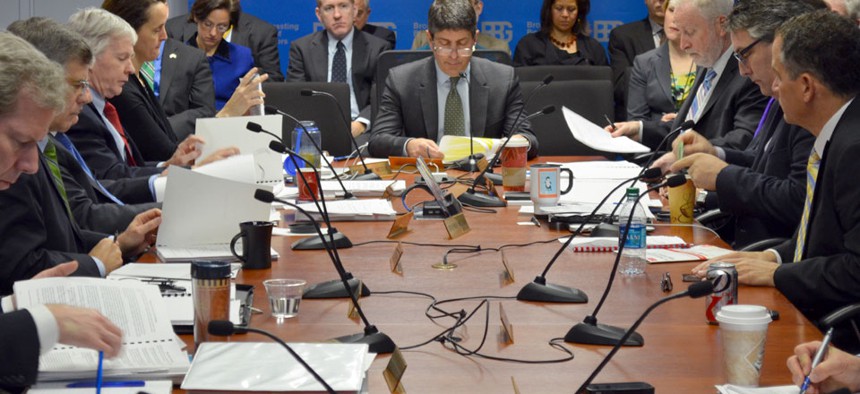
Foreign Policy
by Kelly Wright (November 15, 2024)

The United States is a “beacon of democracy”. We used to be pretty good at advocating this notion. Current American messaging to the world promotes controlling media in the name of countering disinformation. We can promote FREE SPEECH by reestablishing the Broadcasting Board of Governors with an emphasis on virtual private networks.
Various media instruments function as the United States' megaphone to the world. The best known is Voice of America (VOA) — the name says it all.
After the end of the Cold War, the United States no longer needed an agency to counter communist propaganda. The U.S. Information Agency (USIA), which governed the VOA and other state sponsored networks, was replaced by the Broadcasting Board of Governors (BBG).
The various networks were then overseen by a diverse group drawn from the fields of mass communications, broadcast media and international affairs.
The intention of the BBG was to prevent the informational outlets they governed from becoming partisan tools. VOA, Radio Free Europe / Radio Liberty, Radio and TV Martí, Radio Free Asia and the Middle East Broadcasting Networks could report on American politics and policy, however, in a neutral / journalistic way.
The BBG worked, for the most part, until it was abolished by the National Defense Authorization Act of 2017.
This Act established the U.S. Agency for Global Media (USAGM). The new agency is now controlled by an appointed executive officer.
Problems arose almost immediately with the new agency. President Trump’s USAGM director tried to shape the agency, resulting in political controversy.
Partisan politics continued to affect USAGM. VOA’s Urdu Language Service is targeted to audiences in Pakistan, India and around the world. The Urdu Service posted content on its website, Facebook, Twitter and Instagram pages about an online event of Biden addressing Muslim Americans. This “report” blurred the lines between journalism and a campaign ad; creating more political controversy at the USAGM.
In the following years, the agency aligned with vapid American legacy media. USAGM’s outlets reported favorably about EU, Brazilian and Australian attempts to censor U.S. based social media companies.
Americans are tuning out of corporate news and opinion. New sources of information have reshaped the media landscape.
Reform is desperately needed. The Broadcasting Board of Governors is an idea whose time has come again.
The new BBG should reflect a spectrum of mass communication perspectives and include leaders in libraries and information access.
The resurrected BBG could actually save free speech at home and abroad. The Board needs to guide the various informational outlets to emphasize the value of free speech, while at the same time be a conduit for unfiltered American media.
The free speech ethic needs to counter the state censorship emerging from the EU. The United States liberated Europe in the 1940s, and resisted the subsequent Soviet domination of Eastern Europe. The moment is here to honor our American legacy by championing freedom of speech.
I propose we appoint new media people like Walter Kirn, Michael Shellenberger and Matt Taibbi — individuals whose work has uncovered governmental collusion with media companies to suppress and discredit voices contrary to state narratives.
Federal statues protect USAGM media outlets from any ‘editorial interference’. A resurrected BBG could meet this requirement, while at the same time, keep up with technological advances transforming media.
During the USAGM’s bureaucratic expansion, it acquired The Open Technology Fund (OTF), an American nonprofit corporation.
OTF has provided grants for virtual private network (VPN) service in Iran and Russia. This VPN should become the primary activity of a new BBG, and be expanded to include the whole world. Let’s provide people in the UK, EU, Brazil and Australia uncensored access to the American internet. This VPN would provide the world access to America’s free speech marketplace.
American social media companies available on the new ‘Virtual American Network’ would also effectively immunize themselves from fines and prosecution by foreign censors. If foreign governments have a problem with what their people learn from the United States at our Virtual Newsstand, they can take it up with the Department of State.
The only recourse malign foreign governments will have, is to try to ban the United States ‘Virtual American Network’. Good luck with that. Both Apple and Google — the main way that all western phone users get apps — are controlled by American companies.
Most informational routes lead to the United States. As such, let’s promote the American values of free speech.
Kelly Wright is a foreign policy specialist with 20 years of experience in Diplomacy, Development and Defense, working directly for the US government as well as numerous NGOs and other implementing partners in Pakistan, Iraq, Afghanistan and Yemen.

